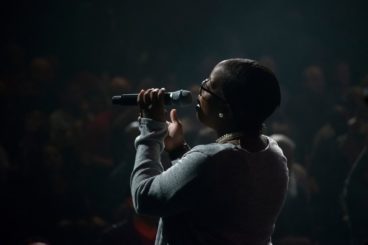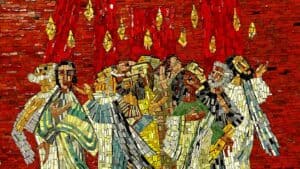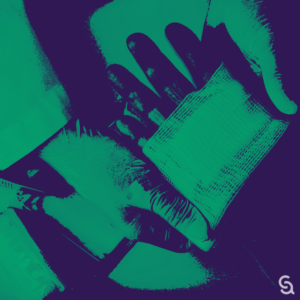
When masses of people in Northern Ireland gathered to demand equal rights from the British, they rallied together singing a song of hope.
After the Cold War era came to an end, people in Eastern European countries protested communism by organizing huge demonstrations and singing a song to inspire courage.
At a recent International Conference of Buddhist Women held in Malaysia, young Tibetan nuns linked their arms and broke out in a song of freedom.
The song they sang was “We Shall Overcome.” This piece of music, which has spanned the world inspiring hope, courage and the movement toward freedom, originated as a simple Christian gospel hymn written in 1900 by an African American pastor who was the son of a slave. When the Reverend Charles Albert Tindley first wrote the song, he had no idea of the far-reaching and enduring impact his song would have on people all over the planet seeking basic human rights and freedom.
When the Reverend Charles Albert Tindley first wrote “We Shall Overcome,” he had no idea of the far-reaching and enduring impact his song would have on people all over the planet seeking basic human rights and freedom.
Tindley was born on July 7th, 1851 near Berlin, Maryland. His father, Charles Tindley, was a slave but his mother, Hester Miller Tindley, was a free woman. Though the elder Tindley was owned by farmer Joseph Brindel, his son’s free status was recognized. However, as soon as he was old enough to be hired out, the younger Tindley was sent to work beside slaves on the farm. With no formal educational opportunities available to him, Tindley taught himself to read and write using the Bible as his only textbook. A determined student, he later said with pride that eventually he could read the entire Bible “without stopping to spell out the words.”
In 1868, at 17, he married Daisy Henry with whom he would raise a family of eight children. Seeking better opportunities for himself and his growing family, Tindley moved to Philadelphia in 1875. There, he worked as a laborer carrying equipment to bricklayers. His second job was as a sexton (meaning a caretaker or janitor) at Philadelphia’s Bainbridge Street Methodist Episcopal Church. Always naturally inclined toward a spiritual path, Tindley was delighted to have this link to a church in his new city.
Along with work and family life, Tindley continued to seek further educational opportunities. He took a correspondence course in theology offered through the Boston University School of Theology, and met with a Philadelphia rabbi who tutored him in Biblical Hebrew. By 1885 he felt confident enough to seek ordination in the Episcopal Methodist Church’s segregated Delaware Conference. After holding a variety of minor probationary church appointments, Tindley was fully ordained in 1889.
In an ironic twist of destiny, Tindley was appointed in 1902 as the minister of Philadelphia’s Bainbridge Street Church, the same church where he worked as a janitor a few years earlier. His appointment proved to be timely for both church and pastor. Tindley’s growth and evolution as a pastor, preacher and orator matched the growth of his small, struggling congregation. When he arrived, church membership was a mere 130 people. But his incredible preaching and oratorical skills quickly increased membership. Within a few years, the church had to relocate to accommodate an ever-growing congregation—by 1906 there were 5,000 members, a number which continued to increase, peaking out at 10,000 members with more than 5,000 active.
In an ironic twist of destiny, Tindley was appointed in 1902 as the minister of Philadelphia’s Bainbridge Street Church, the same church where he worked as a janitor a few years earlier.
Crowds at Tindley’s church were so large that church leaders had to raise funds to build a new sanctuary, which could seat 3,200. Tindley remained the senior minister for the rest of his life, and the congregation honored their minister by renaming the church Tindley Temple when it was opened and dedicated in 1925. Sadly, his beloved wife Daisy died in 1924, a few months before the new church was set to open.
As minister to one of the largest churches in the city—and one of the few in Philadelphia where a number of white Americans joined the congregation for worship—Tindley worked with politicians and business leaders to assist his members in finding employment. He promoted, heavily, the importance of home ownership and advised people to begin their own businesses and be self-employed. Tindley also used his influence to address issues of racism. In 1915, he led a group of African Americans to the Forrest Theater where they protested the showing of the recently released film The Birth of A Nation. This film was controversial across America and offensive to African Americans because it presented Black men as unintelligent and disrespectful toward white women. As well, the Ku Klux Klan was portrayed as a noble, patriotic, heroic movement in American history. At the protest, Tindley and his group were viciously attacked by mobs of whites who beat them with clubs, sticks and bottles. Many were injured and required hospitalization. Tindley was one of the injured, but was treated at home.
Though untutored in music, Tindley had natural musical gifts that would would play a prominent role in his life and ministry. He often sang in church services, and would frequently pause during one of his sermons to sing. As melodies and lyrics came to him, Tindley began to put pen to paper, eventually writing more than 60 hymns. Several of his hymns continue to appear in modern hymnals. One of his earliest songs was written and published in 1900, titled “I’ll Overcome Some Day.” It became widely used in congregational singing and, in 1945, underwent a transformation when the words were changed to the plural “We Shall Overcome Some Day.” This slight change was introduced by Zilphia Horton, an American union organizer, civil rights activist and musician. Horton had the remarkable ability to take popular songs from church hymnals, such as “Keep Your Eyes on the Prize,” “This Little Light of Mine,” or “We Shall Not Be Moved,” and transform them into protest songs. In October of 1945, Horton adapted Tindley’s hymn for union workers on strike in Charleston, South Carolina. With them on the picket line, Horton led them in linking arms and singing “We Shall Overcome.” A few years later, in 1950, the song was recorded and increased its visibility and popularity among various groups supporting civil rights.
“We Shall Overcome” was launched as the anthem of the American Civil Rights movement in August of 1963. At that time, 300,000 civil rights supporters met at the Lincoln Memorial in Washington, DC. There, a 22 year-old folk singer named Joan Baez led the crowd of 300,000 in singing “We Shall Overcome.” Two years later, President Lyndon Johnson gave the song even greater visibility when he addressed Congress on March 15, 1965. Prompted by the vicious attacks on civil rights demonstrators marching from Selma to Montgomery, Alabama, Johnson’s speech vowed to fight for voting rights for all Americans, declaring to Congress that “we shall overcome” racism and segregation.
“We Shall Overcome” was launched as the anthem of the American Civil Rights movement in August of 1963.
Three years later, Dr. Martin Luther King, Jr., recited the words of the song in his final sermon delivered in Memphis, Tennessee on Sunday March 31, 1968: “We shall overcome. We shall overcome. Deep in my heart I do believe we shall overcome. And I believe it because somehow the arc of the moral universe is long, but it bends toward justice. We shall overcome because [Thomas] Carlyle is right; ‘No lie can live forever’. We shall overcome because William Cullen Bryant is right, ‘Truth crushed to earth will rise again.’” King went on to tell listeners, “With this faith we will be able to hew out of the mountain of despair a stone of hope. With this faith, we will be able to transform the jangling discords of our nation into a beautiful symphony of brotherhood. With this faith, we will be able to speed up the day.”
Tindley’s song continued to grow in popularity. Striking farmworkers sang the song in Spanish during the grape boycotts of 1965. Senator Robert Kennedy led the chorus from a car rooftop when he addressed anti-apartheid groups in South Africa in 1966. Later, anti-communist movements all over Eastern Europe marched, protested and sang “We Shall Overcome.” Author Mark Allen was living in Czechoslovakia when the country was seeking to end communist rule. In his book, Velvet Revolution, Allen wrote of “We Shall Overcome:” “In Prague in 1989, during the intense weeks of the Velvet Revolution, hundreds of thousands of people sang this haunting music in unison in Wenceslas Square, both in English and in Czech, with special emphasis on the phrase ‘I do believe.’ This song’s message of hope gave protesters strength to carry on until the powers-that-be themselves finally gave up hope themselves.”
Charles Tindley died on July 26, 1933 at the age of 82. The entire city of Philadelphia mourned the loss of this remarkable human being, and the son of a slave. It was reported that 5,000 people jammed into Tindley Memorial, a church that could comfortably seat only 3,200. His song, written at the beginning of the twentieth century, continues to circle the globe inspiring and energizing all people struggling for freedom. It continues to be heard outside of presidential palaces and inside primitive prisons, and even today, someone, somewhere may be singing “We Shall Overcome.”
Victor M. Parachin is a minister and the author of numerous books.


